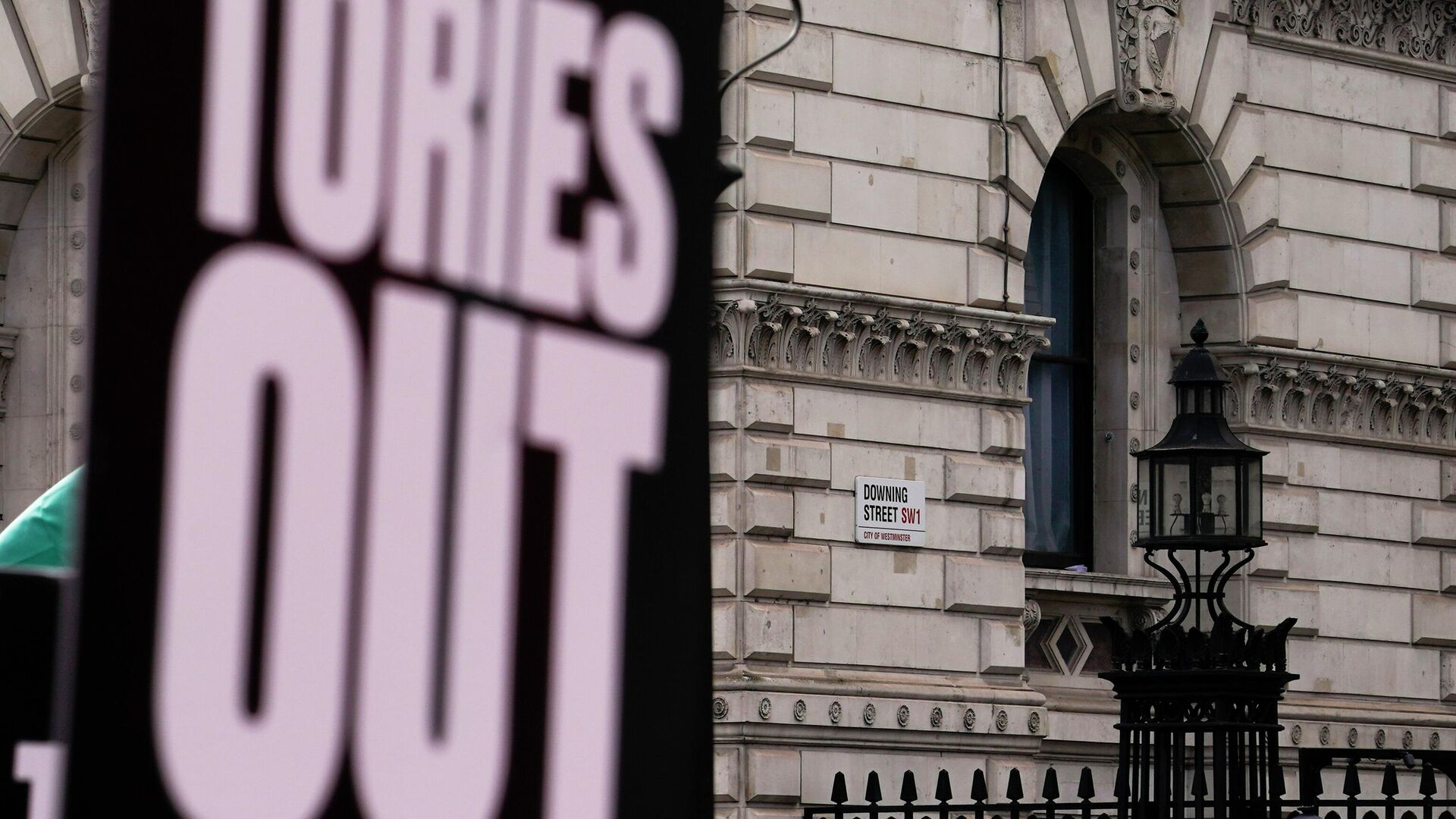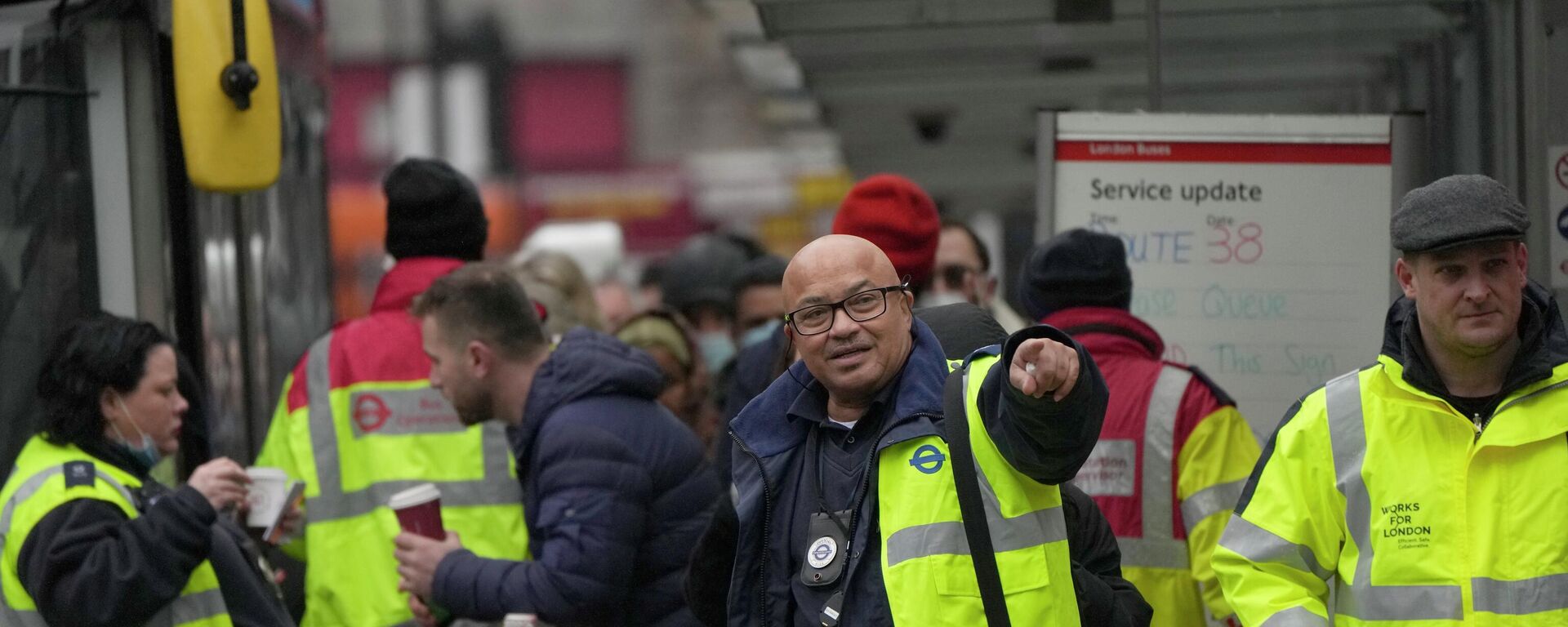UK's Tory Government Faces Social Collapse, Having No-One But Itself to Blame
05:48 GMT 21.06.2022 (Updated: 15:19 GMT 28.05.2023)

© AP Photo / Alberto Pezzali
Subscribe
While UK Prime Minister Boris Johnson argues that the nation will get through the cost of living crisis, socio-economic problems continue to snowball under the Conservative government, with a wave of nation-wide strikes across various industries threatening to engulf the nation.
Thousands took to the streets of London on 18 June, urging the government to take action over the rising cost of living. Protesters carried banners which read: "Britain needs a pay rise," "Cut energy bills now," "Tax wealth not workers," and "We demand better, enough is enough."
"The impact of high inflation and falling real wages is so enormous that the government simply can’t afford to compensate the population for the resulting fall in living standards, especially in the context of already alarming levels of public debt," says Dr. Richard Wellings, an independent British economist, author and researcher.
Tories' Self-Inflicted Inflation
Skyrocketing inflation has been singled out as a root cause of the cost of living crisis the UK has been facing for months now. In April, the Consumer Prices Index (CPI), a popular gauge to measure inflation, soared by 9.0%, its highest annual rate since 1982. The Bank of England said that inflation is likely to go up and reach over 11% in the fall.
According to British economists, the issue was fueled by COVID stimulus packages provided by the government, as well as supply chain disruptions and red tape problems in the aftermath of Brexit. However, the unfolding crisis in the UK is all but self-inflicted, according to Rodney Atkinson, a British academic and former ministerial adviser.
"All the damage was done with monetary policy in the last two years, the COVID lockdown of virtually the whole economy," Atkinson told Sputnik in April. "In other words, [it was] a double blow of reduced supply of goods and services and a massive increase in money supply through quantitative easing."
To complicate matters further, a combined effect of the government's lockdown measures and "climate initiatives" pushed energy prices through the roof, with petrol and diesel increasing by roughly 41% over the last twelve months; while gas and electricity costs soared by a staggering 53.5% and 95.5%, respectively, year-on-year.
As if that were not enough, the British government introduced an energy embargo on Russia over the latter's special operation in Ukraine and persuaded the EU to follow suit. It was nothing short of suicidal, Dr. Mamdouh G. Salameh, an international oil economist and visiting professor of energy economics at London's ESCP Europe Business School warned in March. According to him, the higher energy prices go up, the higher the inflation is and the more damage is inflicted on the UK and European economies.
Meanwhile, the UK's leaders are still far from recognizing their erroneous policies and have actually done very little to address the root causes of the cost-of-living crisis, according to Richard Wellings.
"The real solution is to roll back the 'green' agenda and the other misguided interventions that sowed the seeds of the current problems," insists the economist. "What’s needed is a massive bonfire of red tape, including removing the trade barriers and regulations which have pushed up energy prices."
Tories Keeping Wages Low to Pay for the Cost of Living Crisis
To address the issue of British households' squeezed budgets, the Tory government has introduced extra payments on welfare benefits to help the households cope with rising bills. In late May, Chancellor Rishi Sunak announced a £21 billion ($25.7 billion) package of cost of living support including a £400 ($490) discount on energy bills for all and a £650 ($796) one-off payment to the poorest eight million households.
Sunak vehemently denied that his cost-of-living package will exacerbate the ongoing crisis by putting extra cash in the economy and funneling inflation.
However, Richard Wellings does not buy into the chancellor's argument: "This is likely to be counterproductive and make inflation worse, particularly if it ends up being financed by further money-printing by the Bank of England," he warns.
What the UK Treasury does consider "inflationary" are pay raises for British workers in line with inflation. According to Treasury Minister Simon Clarke, increases in salaries to meet the rising cost of living could end up yielding a 1970s-style “inflationary spiral”. Meanwhile, annual growth in regular pay, excluding bonuses, slid by 4.5% in April after adjusting for inflation, according to the Office for National Statistics. This represents the biggest fall since 2001.
Meanwhile, the cost of living crunch has forced 48% of British respondents to turn the heating down in their home; a third have started socializing less; and four in 10 people polled say they have switched to buying cheaper brands or using cheaper stores to cut back. Some of the respondents noted that after all their bills are paid, they're left with just a few pounds to live on.
A group of 67 economists have warned Johnson that keeping wages down amid the cost of living crisis is fraught with the risk of plunging the UK into recession. They argue that quite the opposite is needed to keep the economy afloat and maintain demand. Asking workers "to pay the cost of living crisis by limiting their wage demands will deepen the crisis," they said.
Tory Government Locks Horns With Unions
The pay raise issue and looming job cuts prompted British railway workers to opt for nation-wide walk outs on June 21, 23 and 25, threatening to paralyze the services for six days, according to Network Rail. The strike is expected to be the biggest to hit the railways since 1989.
Mick Lynch, general secretary of the National Union of Rail, Maritime and Transport Workers, told the press that the union had no choice but proceed with striking as the Tory ministers had not allowed employers to negotiate "freely" on pay, job cuts and conditions. According to Lynch, rail workers were faced with thousands of jobs cuts, reduced pensions and a slight pay rise which was not in line with inflation.
For his part, Transport Secretary Grant Shapps argues that it's all about "outdated unions opposing progress" and preventing the industry from updating "obsolete working practices."
The row between the Tories and the unions started brewing a year ago over Johnson's railway reform. The UK government sought to overhaul the system as passenger revenue has declined by more than 80% since the beginning of the COVID pandemic. While No 10 claims that the reform will boost the rail network's efficiency and offers a "decent annual pay raise," the unions warn that this will come at the expense of thousands of jobs and deteriorated conditions for workers.
The rail strike has every chance of spilling over into other sectors of the UK economy. Teachers and National Health Service (NHS) staff are reportedly set to follow suit as the education and healthcare unions have signaled their readiness to launch strikes in response to pay freezes and working conditions. No 10 appears to be looking for a conflict with unions: Shapps even went so far as to threaten to outlaw industrial strikes, as Steve Hedley, senior assistant general-secretary of the UK's Rail, Maritime and Transport Union told Sputnik on Sunday.
Future of BoJo's NHS Reform is Bleak
The National Health Service (NHS), the umbrella term for the publicly funded healthcare systems of the UK, appears to have every reason to take to the streets as the understaffed sector has faced an unprecedented degree of pressure since the beginning of the COVID pandemic.
Meanwhile, the cost of living crunch has exerted additional pressure on healthcare: the mental health of the nation faces a “threat of pandemic proportions,” warned Dr. Adrian James, the head of the Royal College of Psychiatrists, as quoted by The Independent earlier this week.
"The economic crisis will certainly have a negative impact on both physical and mental health, with harmful long-term consequences for society and the economy," says Richard Wellings. "These effects will result in more people having to take time off from work, greater dependence on state handouts, and even more pressure on the National Health Service – at a time when resources are already extremely stretched."
Last year, the Johnson government came up with a healthcare reform idea to rescue the chronically underpaid sector. The Tory government plans to fund it through the Health and Social Care Levy, a proposed tax for extra health spending, expected to be launched in 2023. The measure envisages increasing National Insurance contributions by 1.25% for almost everyone and may have a "significant" impact on wages, inflation, and company profits, HM Revenue and Customs warned last year. It is unclear how the reform will pan out amid the unfolding crisis.
To make matters worse, millions of NHS employees are due to receive a pay offer from the government substantially short of inflation, which is currently 9%. That will bring them between a rock and a hard place as the BoE is raising borrowing costs, anticipating 11% inflation this autumn. Unison, a union representing NHS staff, warns that the BoJo cabinet now faced a choice between offering a better deal to health workers or seeing a mass exodus of staff.
'Beating Crime Plan' Still Remains on Paper Only
Frustration and discontent brewing within the British society are amplified by rising crime rates and the police's apparent incapability to tackle the emerging threats.
Estimates from the Telephone-operated Crime Survey for England and Wales (TCSEW) for the year ending December 2021 compared with the pre-coronavirus year ending December 2019 indicated an 18% increase in total crime, driven by a 54% increase in fraud and computer misuse offences and a 15% decrease in theft offences.
Home Office data has shown that police have failed to solve more than one million burglaries over the past six years, and that the charge rate has fallen 40% over that time period. Despite the devastating impact of break-ins, burglary is not seen as a policing priority, with investigations being often closed within hours if there is no CCTV or forensic evidence readily available, according to The Telegraph. In the wake of the newspaper's bombshell report, Home Secretary Priti Patel admitted on Monday that the data exposing the scale of unresolved burglaries are "deeply troubling".
The statistics indicate that the major objectives of Boris Johnson's "Beating crime plan," which envisaged "less crime, fewer victims, and a safer society", have not been reached so far, notes Dr. David Lowe, a senior research fellow at Leeds Beckett University’s Law School, and a retired police officer. The crux of the matter is that the premier's proposals have been "ill-thought through" and have not taken into account previous police staff cuts.
A previous Tory government reduced the size of the police force by 22,000 officers, thousands of police community support officers and tens of thousands of backroom staff about 11 years ago.
"This ability to carry out those plans is made worse when the number of police officers is lower than what it was in 2010," says Lowe. "While the current UK government has had a recruitment drive, the target was simply to bring the number of police officers to the number it was in 2010, not to increase that number."
Without the substantial increase in funding and the number of police operational officers the populist, vote-catching major crime initiatives promoted by British politicians will remain unrealistic, according to Lowe.
Meanwhile, The Times reported in late May that the British police forces had begun planning for disorder over the summer amid fears that the cost-of-living crisis and other pressures could trigger civil unrest.
Given that the government has yet to offer a consistent recovery plan to tackle with the emerging crisis, protests will likely to go on, Steve Hedley told Sputnik. If the government tries to suppress these strikes by force, there will come public problems and disorder on the streets, forecast the unionist leader.

